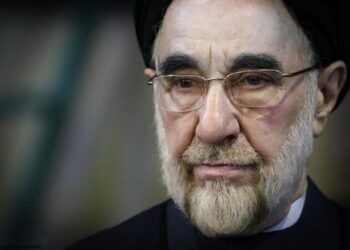His published position put him at odds with Supreme Leader Ali Khamenehi, who only recently repeated his long-standing opposition to such talks.
“If we negotiate with them [other major powers such as France, Russia and China], why shouldn’t we talk with America?” Rafsanjani said in an interview published in the current issue of International Studies Journal, an Iranian scholarly quarterly.
“The meaning of negotiations is not that we submit to them. We negotiate, and if they accept our positions or we accept theirs, then it is done,” Rafsanjani said in response to a common fear in the Islamic Republic that the skillful American negotiators would take Iran’s negotiators to the cleaners in any bilateral diplomatic talks.
Rafsanjani, a renowned pragmatist and non-ideologue, has long advocated talks with the United States. A quarter-century ago, he wrote a letter to Ayatollah Khomeini urging such talks.
But he hasn’t normally talked publicly about his position, which enrages the revolutionary ideologues while pragmatists are browbeaten into silence.
It is unknown what proportion of the establishment thinks direct talks with Washington are a good idea. But the proportion is thought to be growing now that the possibility of war is widely thought to be rising exponentially. Public debate, however, is stifled by Khamenehi’s loud and firm opposition.
Khamenehi was a moderate before he became Supreme Leader in 1989. He rarely resorted to anti-American rhetoric before that. But since rising to Supreme Leader, the Iran Times has only seen two speeches in which he did not include at least a passing swipe at the perfidy of the United States. Some analysts believe his regular rhetorical attacks on the United States are designed purely to please the ultra-right, whose street thugs are a key to retention of power by the regime, and do not represent Khamenehi’s personal beliefs.
The fact that Rafsanjani is now trying to open the issue to public debate suggests he may feel the time is now opportune to do so.
While Khamenehi has been firm in opposing any talks, it is understood that all three presidents who have served under Khamenehi—Rafsanjani, Mohammad Khatami and Mahmud Ahmadi-nejad, who represent three different strains within the regime establishment—have all sought to initiate talks with Washington and been rebuffed.
There are still plenty of voices opposing talks. After Rafsanjani’s interview appeared, Deputy Hossain Ebrahimi, the vice chair of the Majlis National Security Committee, told the Mehr news agency, “We do not need to have relations with the United States as we are in the best conditions. It is America that needs relations with us. Iran is considered to be the key to American interests [in the region].”
This is standard chest-thumping rhetoric. But it is not clear that very many officials actually believe that.
In his magazine interview, Rafsanjani also advocated that the Islamic Republic launch a major effort to improve ties with Saudi Arabia, which have been allowed to atrophy in recent years.
“If we had good relations with Saudi Arabia, would the West have been able to impose sanctions [on Iranian oil exports]?” Rafsanjani asked, a reference to the fact that the Saudis have offered to open the spigots to supply countries that cease buying Iranian oil. “Only Saudi Arabia could fill the void left by [the absence of oil from] Iran. [If the Saudis just] produce oil within their OPEC quota, then no one would be able to harass us.”
Rafsanjani said: “Relations with Saudi Arabia are not a trivial matter. I think it is still possible to form good relations. But there are people who do not want thisÖ. Some harsh remarks coming from both sides should be corrected.”
Iranian relations with Saudi Arabia were at rock bottom when Rafsanjani became president in 1989 as a result of an incident during the annual hajj in 1987 when Saudi police fired on Iranians marching in Mecca who refused orders to halt. A total of 402 people died that day and Iran stopped participating in the hajj as a result. Under Rafsanjani, negotiations resolved the hostilities and returned relations to normal.
Under Khamenehi’s policy, it is permitted for Iran to enter diplomatic arenas in which the United States is one of many participants. Thus, Iran will sit down later this month with the United States plus China, Russia, Germany, France and Britain for talks on Iran’s nuclear program. What is officially verboten is bilateral talks with the Americans on bilateral relations.
But, in reality, Iran and the United States have frequently sat down for bilateral talks. In fact, the largest volume of talks probably took place under President George W. Bush, despite the perception that relations were most hostile during the Bush Administration. Mid-level Iranian and American diplomats at the United Nations set down every few weeks for talks in the early years of the Bush Administration. Later, some high-level State Department officials sat down for a few head-to-head sessions with Iranian officials. And after the fall of the Taliban, US and Iranian diplomats actually worked hand-in-glove together to help fashion a new government for Afghanistan that both countries could accept.
Rafsanjani’s interview appeared in print only a few weeks after Khamenehi had re-appointed him as chairman of the Expediency Council, the main body that advises the Supreme Leader on long-term policies.














